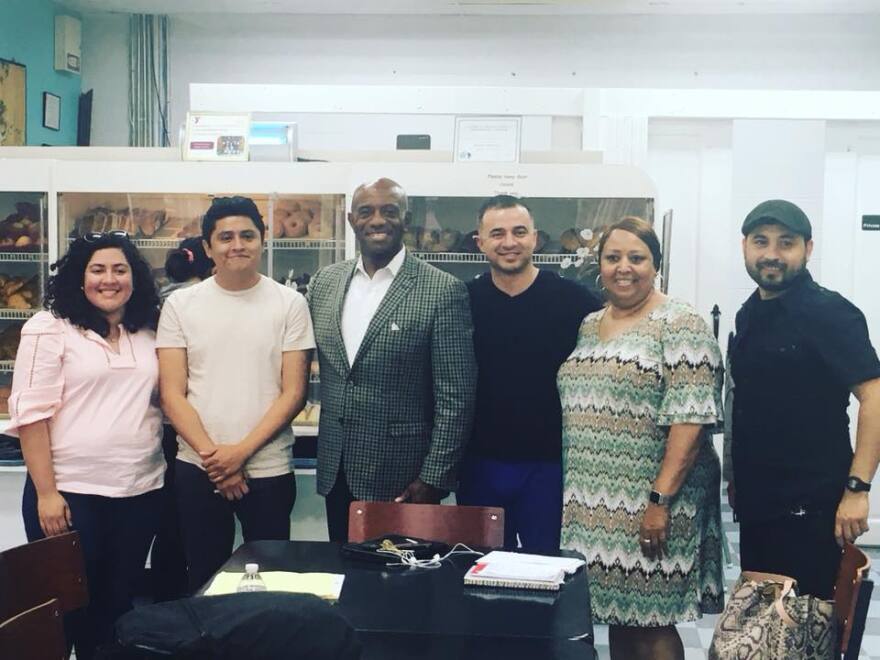Latino voter turnout in Mecklenburg County spiked during the May primary, according to elections data. Experts and organizations are attributing the increase to the Sheriff's race and local immigration policies. Now, election observers are wondering if the momentum will continue into the general election.

Music and the aroma of grilled meats and Caribbean spices fill the air as festival goers move from tent to tent.
Among those attending Ritmo y Sabor, a celebration of Caribbean culture, is school teacher Ana Brown. She’s originally from Peru.
“I was born in Iquitos, but was raised in Lima and Arequipa,” Brown said. “My dad was a pilot so we moved around.”
Brown has been in North Carolina for 31 years. She considers herself a Charlottean and said being politically active is an important part of that. Brown is an active member of the Democratic Party.
“I think it’s very important to make sure that the right people are voted in,” Brown said.
And voted out. Brown said local immigration policies, particularly ending Mecklenburg County’s participation in the 287(g) program, was a huge motivation in getting her to the polls in the May 8 primary. Election data showed that Brown wasn’t alone.
Michael Dickerson, the director of the Mecklenburg County Board of Elections, said more than 1,200 Latino voters participated in the primary. That turnout is three times larger than 2014, the last similar midterm election that didn’t have a presidential or statewide race on the ballot.
Of the 1,200 Latino voters, over 600 were Democratic, more than 400 were unaffiliated and about 120 voted Republican.
Dickerson said the spike in voter turnout is on par with the increase in the Latino population and the number of eligible voters.
“As you see the pool get larger,” Dickerson said, “you’ll see a larger number of those folks voting in every primary and every general election.”
Census population data estimates about 13 percent of the county's residents identify as Hispanic, up from 12.2 percent in 2010. That is an estimated growth of about 30,000 Latinos in that seven-year period.

But Oliver Merino, of Comunidad Colectiva — an organization that advocates for rights of immigrants and Latinos — pointed to a specific issue to explain the increase in voter turnout.
“It was very clear from Spanish media and from organizations that this election was about 287(g),” Merino said.
287(g) is a program that allows county Sheriffs to partner with Immigrations and Customs Enforcement, or ICE, in identifying undocumented immigrants. Through the program, officers can ask the immigration status of people brought into jail, hold them if they’re undocumented and then transfer them into ICE custody — among other functions.
Merino said incumbent Sheriff Irwin Carmichael was ousted in the primary because of his participation in 287(g). Winner Gary McFadden campaigned on a vow to end the program, which is why Comunidad Colectiva threw its support behind him.
”We had a connection with the media, the Spanish media,” Merino said. “We were in the newspapers and radio stations asking people if they were able to vote to go out and vote against Sheriff Carmichael and for Gary McFadden.”
End 287(g) — that was the message that got many Latino voters to the polls in May. Queens University Political Science Professor Maggie Commins said she’s afraid that momentum won’t continue for the general election in November.
“I suspect that this primary and the turnout for the Sheriff’s election was an aberration,” Commins said. “I think we will see a long-term trend up in the turnout, but I don’t think we’ll see the kind of bump that we saw in this primary.”
A look at statewide data indicates that Commins may be right. In the primary, almost 7.500 Latinos turned out to vote in North Carolina. That’s about 3,000 more than turned out in 2014.
When taken into the context of voter registration, the growth is smaller. This past May, about four percent of registered Latino voters turned out, up from three percent in 2014. So, participation is growing, but it’s growing slowly.

Commins said if people can’t see an immediate tie between voting and policy outcomes like they did with 287(g) and the ousting of a sitting sheriff, the momentum could die out.
José Hernández-Paris, director of the Latin American Coalition, said his organization is going to work hard not to let that happen. He said the coalition hopes 287(g) was just the start.
“We are hopeful that this will be the beginning of more engagement, more political engagement for our community,” Hernández-Paris said.
Even though there may not be a specific issue on the ballot to drive Latino vote, Hernandez-Paris said he’s trying to show the community the large-scale importance of participation.
“The biggest barrier is the perception that the vote doesn’t count,” Hernández-Paris said. “I think we’ve been led to believe that’s a reality. The fact is that it’s not.”

And to continue the 287(g) momentum, he said the coalition will work on educating Latinos on policies that affect them, like those regarding education and affordable housing.
“We have seen change when people decide to vote locally for a better community, for a more exclusive community,” Hernández-Paris said.
He said that’s the message the coalition, and other organizations will push for the general election and beyond.



